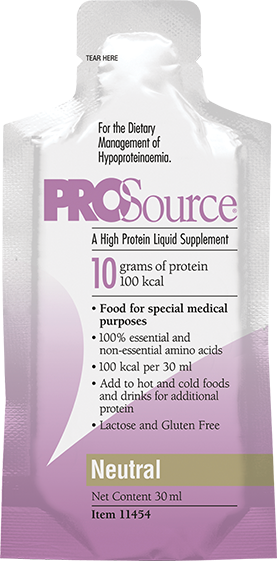
ProSource Liquid
ProSource Liquid is a unique, concentrated high protein & calorie supplement that contains 10g of protein and 100kcal in just 30ml of liquid! Available in three great tasting flavours – Orange Crème, Citrus Berry and Neutral. Presented in ready to use 30ml sachets, flavoured ProSource Liquid can be taken as a ‘shot’ or enjoyed as a drink; whilst ProSource Liquid neutral can be administered with a tube feed, or added directly to a patients meal, drink or sip feed – without any of the complications associated with powdered or higher volume sip feeds.
Click here to see which IDDSI level each Nutrinovo product is.
Product introduction video
Product Features & Benefits
10g protein in each 30ml sachet
Ideal for protein energy malnutrition and patients on a fluid restricted diet e.g. wounds, pressure sores, burns, renal disease, oncology, liver disease, bariatrics and elderly malnourished.
Ready to use liquid
Suitable for oral consumption directly from the sachet.
Suitable for use with tube fed patients
Can be easily mixed with 30ml of water prior to administering via an enteral feeding tube.
Available in neutral and two great tasting flavours
Helps promote compliance and can support food fortification.
A complete protein
ProSource Liquid is complete in all essential amino acids at levels high enough to ensure quality.
Uses hydrolysed collagen
Hydrolysis breaks down proteins into smaller peptides, which aids gut absorption.
Single use sterile sachets
Easy for patients to use and health professionals to administer. Assists with infection control.
Low in electrolytes
Ideal for patients requiring a low electrolyte diet e.g. those on renal dialysis.
ACBS approved
ACBS approved for Hypoproteineamia – widely prescribed and reimbursed within the community
Administration, Dosage & Directions for use
ProSource Liquid should be administered by a clinician or dietitian and dosage is dependent on the age, body weight and medical condition of the patient.
Indications
For the dietary management of hypoproteinaemia. ProSource Liquid is prescribable on FP10/GP10 for the following: Hypoproteineamia
Precautions & Contra-indications
Must only be used under strict medical supervision. For enteral use only. Not suitable as a sole source of nutrition. Not recommended for children under 3 years of age. May not be suitable for vegetarians and other groups due to processing of some of the ingredients. Contains porcine derivatives.
Shelf Life & Storage
ProSource Liquid has a shelf life of 18 months from date of manufacture. Store unopened at room temperature (not exceeding 25oC). Once opened, consume immediately.
Pack Size & Ordering
ProSource Liquid is available in packs of 100 x 30ml sachets.
When to Use ProSource Liquid?
ProSource Liquid’s unique formulation combining 10g protein, 100kcal and low electrolyte levels in just 30ml of liquid make it the ideal supplement for patients suffering from or at risk of protein energy malnutrition and/or when volume is an issue.
Typical conditions where increased protein & energy may be required, or where volume may be an issue include:
- Renal Dialysis
- Cancer Cachexia
- Liver Disease
- Pressure Ulcers
- Burns & Post surgery (e.g. for wound care)
- Elderly Malnutrition
- Bariatrics
- ITU / ICU (tube feeding)
- Fluid Restricted Diets
Renal Dialysis Diets
It’s generally accepted that renal dialysis diets are hard to follow because of the fact that fluid and electrolyte restrictions are often required at the same time as the patient needing an increased protein intake.
ProSource Liquid is the ideal protein supplement for HD and PD patients:
Clinically proven to raise serum albumin levels in HD patients1
Concentrated protein source (10g) in the smallest fluid serving size (30ml)
Low in electrolytes – sodium, potassium & phosphorus
1. Pittaoulis A, Phillips E (2007). Can oral supplementation with a collagen-casein-based liquid protein improve serum albumin levels in hemodialysis patients? Dialysis & Transplantation Magazine; 36 (5): 258-265
Cancer cachexia
Cachexia, or body wasting is typically seen in patients with advanced cancer. Patients often have reduced appetite, or none at all as a result of radiation and/or chemotherapy treatment. Stopping weight loss and improving nutritional status becomes a challenge well suited to a low volume, high protein and calorie dense supplement.
ProSource Liquid provides 10g protein and 100kcal in each 30ml sachet. Flavoured ProSource Liquid can be taken as a ‘truly effective’ shot, whilst ProSource Liquid Original can be administered with a tube feed, or added directly to a patient’s meal, drink or sip feed – helping to improve compliance and combat appetite loss.
Liver Disease
Malnutrition is prevalent in 80-100% of liver patients with decompensated cirrhosis and 20-40% of patients with compensated cirrhosis1.
In all patients with cirrhosis, protein requirements are increased as a result of impaired energy metabolism. The nutritional consequence of inadequate glycogen stores that occur due to this is muscle wasting due to the fact that body protein stores are used as a short-term energy source instead of glycogen1.
Protein levels of between 1.2g and 2.0g per kg body weight are required to maintain nutritional status (dependent upon patient and cirrhosis)1.
ProSource Liquid provides 10g protein and 100kcal in each 30ml sachet and is low in electrolytes. Flavoured ProSource Liquid can be taken as a ‘truly effective’ shot, whilst ProSource Liquid Original can be administered with a tube feed or added directly to a patient’s meal, drink or sip feed – helping to improve compliance and combat appetite loss.
1. Saunders J., Brian A., Wright M. & Stroud, M. (2010) Malnutrition and nutrition support in patients with liver disease. Frontline Gastroenterology. 1,105-11.
Pressure Ulcers
The prevalence of pressure ulcers and wounds is a major concern, especially in long-term care patients. It has long been accepted that nutritional status is an independent risk factor for pressure ulcers.
The European Pressure Ulcer Advisory Panel (EPUAP) recommends providing adequate protein for positive nitrogen balance for an individual with a pressure ulcer. Specifically the recommendations state giving patients with pressure ulcers, or those at risk of developing pressure ulcers, a minimum of 30-35 kcal per kg of body weight with 1-1.5 g/kg/day protein.1
ProSource Liquid provides an unrivalled 10g of high value protein and 100kcal in each 30ml sachet. ProSource Liquid is complete in all amino acids and available in original and 2 great tasting flavours making it easy for patients to consume.
1. European Pressure Ulcer Advisory Panel (2003). Nutritional Guidelines for Pressure Ulcer Prevention & Treatment.
Burns / Post Surgery (e.g. for wound care)
Protein energy malnutrition in the presence of a wound leads to loss of lean body mass, which is likely to impede the healing process1.
Metabolic demands rise in the presence of a wound due to increased cell activity. Indeed, it has been established that basal metabolic rate increases by up to 10 % following minor surgery and by 100 % or more in the case of severe burns2.
Macro and micronutrient demands vary depending upon each patient but it is recognised that protein, as well as specific amino acids are an essential part of feeding patients in these groups with a view to improving wound healing.
ProSource Liquid provides an unrivalled 10g of high value protein and 100kcal in each 30ml sachet. ProSource Liquid is complete in all amino acids and available in original and 2 great tasting flavours making it easy for patients to consume.
1. Robert H, Demling RH. Nutrition, Anabolism and the Wound Healing Process: An Overview. ePlasty, 2009, 9:65-94
2. Casey G. The Importance of Nutrition in Wound Healing. Nursing Standard, 1998, 13(3):51-56
Product Composition
| Composition | Amount per serving (30ml) | Amount per 100ml |
|---|---|---|
| Energy | 100 Kcal | 333 Kcal |
| 333 Kcal | 1400 | |
| Protein | 10g | 33.3g |
| Carbohydrates | 15g | 50g |
| of which sugars | 8g | 26.7g |
| Fat | 0g | <1g |
| Fibre | 0g | <1g |
| Water | 9.8ml | 32.7ml |
| Minerals (Neutral, Orange Creme and Citrus Berry) | ||
| Sodium | 28mg (1.23mmol) | 93mg (4.1mmol) |
| Potassium | 12mg (0.3mmol) | 40mg (1.0mmol) |
| Phosphorus | 81/1mg* (2.61/0.03mmol*) | 270/3mg* (8.7/0.1mmol*) |
| Minerals (Lemon) | ||
| Sodium | 27mg (1.17mmol) | 89mg (3.87mmol) |
| Potassium | 2mg (0.3mmol) | 40mg (1.0mmol) |
| Phosphorus | 76mg (2.45mmol) | 251mg (8.09mmol) |
| Calcium | 7mg (0.17mmol) | 23mg (0.57mmol) |
Osmolality (Neutral, Orange Creme and Citrus Berry) = 650 mOsm/kg water
Osmolality (Lemon) = 625 mOsm/kg water
*Orange Creme and Citrus Berry variants
Amino Acid Profile
| Composition | g per serving (45ml) | g per 100ml |
|---|---|---|
| Essential | ||
| Histidine | 0.090g | 0.300g |
| Isoleucine | 0.130g | .433g |
| Leucine | 0.270g | 0.900g |
| Lysine | 0.350g | 1.167g |
| Methionine | 0.097g | 0.323g |
| Phenylalanine | 0.172g | 0.573g |
| Threonine | 0.200g | 0.666g |
| Tryptophan | 0.070g | 0.233g |
| Valine | 0.230g | 0.767g |
| Conditionally Essential | ||
| Ariginine | 0.810g | 2.700g |
| Cystine | 0.002g | 0.006g |
| Glutamic Acid | 1.050g | 3.500g |
| Glycine | 2.450g | 8.167g |
| Glycine | 1.440g | 4.800g |
| Tyrosine | 0.066g | 220g |
| Non Essential | ||
| Alanine | 0.890g | 2.967g |
| Aspartate | 0.470g | 1.567g |
| Serine | 0.360g | 1.200g |
Ingredients
Neutral – Purified Water, Protein from Collagen Hydrolysate and Whey Protein Isolate, Maltodextrin, Sugar, Phosphoric Acid, Tartaric Acid, Natural Vanilla Flavour, L-Tryptophan, Preservatives: Potassium Sorbate, Sodium Benzoate.
Orange Creme – Purified Water, Protein from Collagen Hydrolysate and Whey Protein Isolate, Maltodextrin, Sugar, Natural Flavours, Citric Acid, Malic Acid, L-Tryptophan, Flavourings (vanillin & ethyl vanillin), Colour (E110), Preservatives: Potassium Sorbate and Sodium Benzoate. E110 may have an adverse effect on activity and attention in children.
Citrus Berry – Purified Water, Protein from Collagen Hydrolysate and Whey Protein Isolate, Maltodextrin, Sugar, Natural Flavours, Citric Acid, Malic Acid, LTryptophan, Colour (E129), Preservatives: Potassium Sorbate and Sodium Benzoate. E129 may have an adverse effect on activity and attention in children.
Allergen Statement
ProSource Liquid is lactose & gluten free. Contains Milk.
Useful Downloads
A range of useful support material has been provided to assist you when using ProSource Liquid. Click on the links below to download each item in PDF format.
- ProSource Liquid Data Sheet
- ProSource Liquid Patient Leaflet
- ProSource Allergens
- Managing a Neuro-rehab Patient using a High Protein Supplement
- ESPEN Guidelines – Liver
- Can Liquid Protein Improve Albumin Levels in HD Patients? – Published Clinical Study from Dialysis & Transplantation Magazine
- Nutritional Guidelines for Pressure Ulcer Prevention & Treatment
- Review article – Renal
- Review article – Woundcare
- Review article – Pressure Sores
- Nutrinovo range IDDSI levels
- Covid-19 Stages – Product Ready Reckoner
- CN Article Burn Care
- Review Article – Pressure Ulcers
- Oral Serving Suggestion – Citrus Fizz
- Oral Serving Suggestion – Ginger Beer Fizz
- Oral Serving Suggestion – Ice Cream
- Oral Serving Suggestion – Porridge
- Oral Serving Suggestion – Soup
- Only ProSource Works Like ProSource – Brochure
- Food Fortification – A Guide for Patients
My patients really enjoy ProSource Liquid – Citrus Berry flavour. Patients are very grateful for the option of a high protein, low carbohydrate supplement.
I love the ProSource products, they really help my liver patients meet their high protein requirements. They are very palatable and my patients find the products easy to tolerate.
I love ProSource as an additional product for my patients. I use it for post-op bariatric patients, who struggle to meet protein requirements. Also, with UGI cancer patients post-surgery, who need extra protein but without the carbohydrate load.
I’ve used your products since becoming aware of ProSource around 2008, they work really well in surgical and oncology patients. Interestingly I’ve also found that they also work well in care homes, as a modular supplement.

